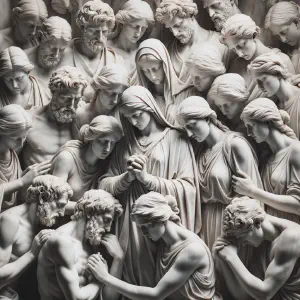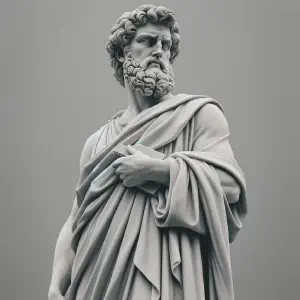The Writing on the Wall
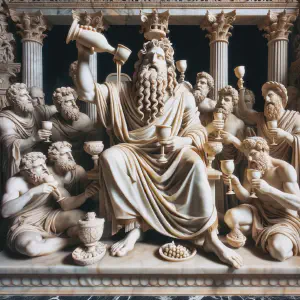
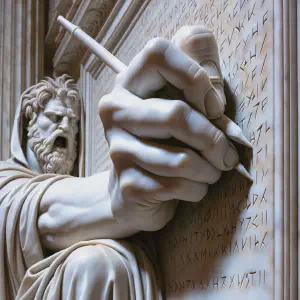
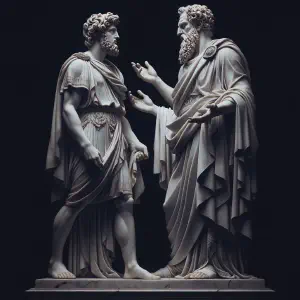
Meanwhile, Jesus, in a distant time, spoke of persecution and trials for those who followed his path. He promised divine wisdom and protection, assuring that not a hair would be harmed, and through steadfast perseverance, they would secure their lives. This echoed the Responsorial Psalm’s call to give glory to the Lord, for everything under the heavens, from the sun to the winds, praised Him eternally. The juxtaposition of earthly power and divine authority was stark - a timeless reminder of the transience of worldly kingdoms and the eternal nature of spiritual truth.
Five Questions
What does the story of King Belshazzar and the writing on the wall represent in a broader spiritual context?
The story of King Belshazzar is a powerful allegory about the consequences of hubris and disrespect towards sacred things. It illustrates how idolatry and arrogance can lead to divine judgment. This narrative serves as a reminder of God’s sovereignty and the importance of reverence for the holy.
How does Daniel’s response to King Belshazzar reflect his character and faith?
Daniel’s response showcases his unwavering faith and integrity. Despite being offered rewards, he remains humble and focused on delivering God’s message. His actions demonstrate a profound commitment to truth and righteousness, emphasizing that true wisdom and understanding come from God.
In what way does the Responsorial Psalm, Daniel 3:62-67, connect with the story of Belshazzar?
The Responsorial Psalm complements the story by contrasting the worship of lifeless idols with the true worship of God. It calls for all creation to praise God, highlighting His omnipotence and glory, in stark contrast to Belshazzar’s praise of inanimate gods, which ultimately led to his downfall.
How does the Gospel of Luke 21:12-19 relate to the themes presented in Daniel’s story?
The Gospel of Luke discusses the persecution and trials faced by believers, mirroring the challenges Daniel faced in a hostile environment. It emphasizes the promise of divine wisdom and protection in times of adversity, reinforcing the message that steadfast faith and perseverance, as exhibited by Daniel, are crucial in the face of challenges.
What lessons can modern believers draw from these readings about dealing with challenges to their faith?
These readings teach modern believers about the importance of steadfastness and integrity in their faith journey. They remind us that worldly powers and challenges are transient, and that true strength lies in unwavering faith and trust in God’s wisdom and justice. They encourage believers to remain true to their convictions, even in the face of adversity or temptation.
Bible Study
Daniel 5:1-6, 13-14, 16-17, 23-28
King Belshazzar gave a great banquet for a thousand of his lords,
with whom he drank.
Under the influence of the wine,
he ordered the gold and silver vessels
which Nebuchadnezzar, his father,
had taken from the temple in Jerusalem,
to be brought in so that the king, his lords,
his wives and his entertainers might drink from them.
When the gold and silver vessels
taken from the house of God in Jerusalem had been brought in,
and while the king, his lords, his wives and his entertainers
were drinking wine from them,
they praised their gods of gold and silver,
bronze and iron, wood and stone.
Suddenly, opposite the lampstand,
the fingers of a human hand appeared,
writing on the plaster of the wall in the king’s palace.
When the king saw the wrist and hand that wrote, his face blanched;
his thoughts terrified him, his hip joints shook,
and his knees knocked.
Then Daniel was brought into the presence of the king.
The king asked him, “Are you the Daniel, the Jewish exile,
whom my father, the king, brought from Judah?
I have heard that the Spirit of God is in you,
that you possess brilliant knowledge and extraordinary wisdom.
I have heard that you can interpret dreams and solve difficulties;
if you are able to read the writing and tell me what it means,
you shall be clothed in purple,
wear a gold collar about your neck,
and be third in the government of the kingdom.”
Daniel answered the king:
“You may keep your gifts, or give your presents to someone else;
but the writing I will read for you, O king,
and tell you what it means.
You have rebelled against the Lord of heaven.
You had the vessels of his temple brought before you,
so that you and your nobles, your wives and your entertainers,
might drink wine from them;
and you praised the gods of silver and gold,
bronze and iron, wood and stone,
that neither see nor hear nor have intelligence.
But the God in whose hand is your life breath
and the whole course of your life, you did not glorify.
By him were the wrist and hand sent, and the writing set down.
“This is the writing that was inscribed:
MENE, TEKEL, and PERES.
These words mean:
MENE, God has numbered your kingdom and put an end to it;
TEKEL, you have been weighed on the scales and found wanting;
PERES, your kingdom has been divided and given to the Medes and Persians.”
In this passage, King Belshazzar, the son of Nebuchadnezzar and ruler of Babylon, commits sacrilege by using sacred Jewish temple vessels for a pagan feast. His actions, violating the respect due to sacred objects, align with the Catholic values against idolatry as outlined in the Ten Commandments. Daniel, known for his unwavering faith and wisdom, interprets the mysterious writing on the wall, a divine judgment against Belshazzar’s blasphemy. This story underscores the themes of divine justice and the consequences of defying God’s commandments.
Daniel 3:62, 63, 64, 65, 66, 67
R. (59b) Give glory and eternal praise to him.
“Sun and moon, bless the Lord;
praise and exalt him above all forever.”
R. Give glory and eternal praise to him.
“Stars of heaven, bless the Lord;
praise and exalt him above all forever.”
R. Give glory and eternal praise to him.
“Every shower and dew, bless the Lord;
praise and exalt him above all forever.”
R. Give glory and eternal praise to him.
“All you winds, bless the Lord;
praise and exalt him above all forever.”
R. Give glory and eternal praise to him.
“Fire and heat, bless the Lord;
praise and exalt him above all forever.”
R. Give glory and eternal praise to him.
“Cold and chill, bless the Lord;
praise and exalt him above all forever.”
R. Give glory and eternal praise to him.
This segment of the Book of Daniel consists of a hymn praising God, where various elements of creation are called to bless the Lord. It aligns with Catholic teachings on the universal call to worship and glorify God, as reflected in the Catechism of the Catholic Church. The hymn’s inclusion of all creation in the act of praise emphasizes the Catholic belief in God’s sovereignty over the entire universe and the importance of recognizing His omnipotence in all aspects of life.
Luke 21:12-19
Jesus said to the crowd:
“They will seize and persecute you,
they will hand you over to the synagogues and to prisons,
and they will have you led before kings and governors
because of my name.
It will lead to your giving testimony.
Remember, you are not to prepare your defense beforehand,
for I myself shall give you a wisdom in speaking
that all your adversaries will be powerless to resist or refute.
You will even be handed over by parents,
brothers, relatives, and friends,
and they will put some of you to death.
You will be hated by all because of my name,
but not a hair on your head will be destroyed.
By your perseverance you will secure your lives.”
Here, Jesus forewarns His disciples of future persecutions they will face for His sake. This passage resonates with the Catholic understanding of redemptive suffering and the Beatitudes, particularly the blessing of those who are persecuted for righteousness. It highlights the role of grace in enduring trials and the promise of divine wisdom in times of adversity. The passage reinforces the Catholic teaching on the value of perseverance and faithfulness in the face of challenges, reflecting the Acts of Mercy in comforting and supporting those who suffer for their faith.
Lessons
These passages teach us about the gravity of honoring God above all else and the consequences of idolatry, as exemplified in the story of King Belshazzar. Daniel’s unwavering faith and wisdom in interpreting the divine message highlight the importance of humility and fidelity to God. The Gospel of Luke and the Responsorial Psalm remind us that enduring faith, even amidst persecution and trials, leads to divine wisdom and ultimate salvation. These readings collectively underscore the transient nature of earthly power and the eternal significance of spiritual truth and obedience to God.
Meditation Prayer
